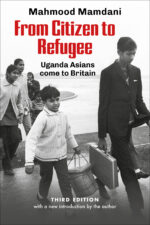-
The Second Coming
USD $ 10.00 USD $ 22.00Price range: USD $ 10.00 through USD $ 22.00Select options This product has multiple variants. The options may be chosen on the product pageThe Second Coming
USD $ 10.00 USD $ 22.00Price range: USD $ 10.00 through USD $ 22.00
In the remnants of a fractured UK, England is on the brink of collapse where far-right militias rise to power. As Islamophobia and English nationalism ignite brutal violence, 19-year-old Marah Sultana is thrust into a fight for survival. Hunted by forces seeking control, she carries a secret powerful enough to change the course of the war—and the future of the world. In a world in which America’s reign as a superpower has crumbled, its mercenaries now rule in its shadow,In The Second Coming, Tariq Mehmood delivers a searing, unflinching narrative that mirrors his own lifelong struggle for justice. This novel is not just fiction—it’s a reflection of real-world battles. Mehmood’s powerful storytelling compels readers to confront uncomfortable truths while offering a gripping, emotional journey of resistance and survival.
A dystopian desi mash-up of The Handmaid’s Tale, Clockwork Orange, and V for Vendetta. The Second Coming warns of the dangers of right-wing nationalism and white supremacy and imagines where such hate could take England if it is not, somehow, nipped in the bud. — Paul Cochrane, journalist, Middle East Eye
A must-read dystopian fantasy about race, religion, and love. Unmissable – Melvin Burgess, novelist, winner of the Carnegie Medal and the LA prize for Teenage Fiction
An unforgettable novel, both vivid and nightmarishly plausible. — Peter Kalu, novelist, storyteller, playwright and poet.
A story of resilience and hope told against the brutal realities of patriarchy and colonial violence.
— Amrit Wilson, activist, feminist, and author of Finding a Voice: Asian Women in Britain (Daraja Press)Select options This product has multiple variants. The options may be chosen on the product page -
Select options This product has multiple variants. The options may be chosen on the product page
From Citizen to Refugee: Uganda Asians Come to Britain
USD $ 15.50In his introduction to this new edition of From Citizen to Refugee: Uganda Asians Come to Britain, Mahmood Mamdani reminds us that long before 1972, most Ugandan ‘Asians’ had already been disenfranchised by law, both Ugandan and British. Despite a global industry that insists otherwise, Uganda Asians are a poor fit as victims: there was no large-scale loss of life during the expulsion, nor were there massacres of Asians, only of ‘indigenous’ peoples. Asians in Uganda, as in East or Southern Africa, he argues, were immigrants, not settlers: immigrants are prepared to be a part of the political community, whereas settlers ‘create their own political community, a colony, more precisely, settler colonialism.’ Mamdani insists that there is no single Asian legacy. there are several and they are contradictory. The Asian question in Uganda remains, but it is no longer the original Asian question. But it does allow us to think more broadly. Just as US law recognizes African Americans as Americans of African descent, so too must those of Asian origin in Africa consider themselves, and be considered, Asian Africans. It is in his bittersweet and touching book on the Asian expulsion from Uganda that one can trace the beginnings of author and intellectual Mahmood Mamdani’s world-view.. … In From Citizen to Refugee: Uganda Asians Come to Britain Mamdani offers portraits of people reduced to a vegetative existence in refugee camps, feeling the burden of not being fluent in English and struggling with the uncomfortably cold weather. Not surprisingly, these few months played a pivotal role in shaping Mamdani’s theoretical and political leanings, and it is here that one can locate his preoccupation with the formation of racial, ethnic and class identities during the colonial era and his overarching concern with issues of citizenship.
Select options This product has multiple variants. The options may be chosen on the product page -
Finding A Voice
USD $ 20.00First published in 1978, and winning the Martin Luther King Memorial Prize for that year, Finding a Voice established a new discourse on South Asian women’s lives and struggles in Britain. Through discussions, interviews and intimate one-to-one conversations with South Asian women, in Urdu, Hindi, Bengali and English, it explored family relationships, the violence of immigration policies, deeply colonial mental health services, militancy at work and also friendship and love. The seventies was a time of some iconic anti-racist and working-class struggles. They are presented here from the point of view of the women who participated in and led them.
This new edition includes a preface by Meena Kandasamy, some historic photographs, and a remarkable new chapter titled ‘In conversation with Finding a Voice: 40 years on’ in which younger South Asian women write about their own lives and struggles weaving them around those portrayed in the book.





